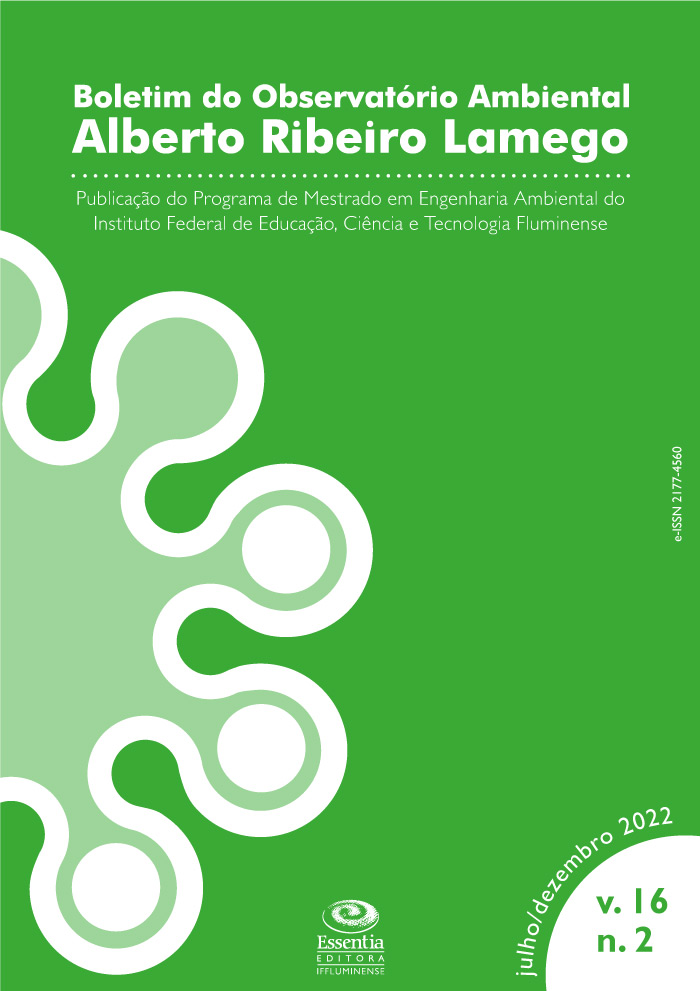Assessment of Compliance with the Water and Sewage Services Policies of the Municipality of Rio das Ostras (RJ) in Comparison to the National Scenario
DOI:
https://doi.org/10.19180/2177-4560.v16n22022p102-119Keywords:
Sanitation, Water, Sewer, Agenda 2030, Treats BrazilAbstract
Basic Sanitation is an indispensable human right for a life with dignity, for public health and social well-being. With this, the objective of this work is to analyze the reality of the provision of water and sewage services in the municipality of Rio das Ostras (RJ). The 2021 Sanitation Ranking methodology carried out by the Trata Brasil Institute was used. In addition, a comparative analysis was carried out between the data from Rio das Ostras and the realities of three other municipalities, these being the capital of Rio de Janeiro, the municipality of Santos (SP) and the capital Macapá (AP). With the methodology, we sought to answer whether the municipality of Rio das Ostras performs a satisfactory service in relation to the fulfillment of SDG 6 of the UN 2030 Agenda and the universalization goals provided for in Law 14,026. It was observed that the municipality presents promising results in relation to the distribution of drinking water to the population. However, the municipality has a great deficiency in the sewage collection and treatment sector. It can be concluded that the municipality needs to expand its investments in the sector, especially in relation to sewage collection and treatment, so that the universalization goals are met.Downloads
References
ANDREAZZI MAR, Barcellos C, Hacon S. Velhos indicadores para novos problemas: a relação entre saneamento e saúde. Rev Panam Salud Publica. 2007.
AROUCA, Maria Clara. Análise Espacial das Condições de Saneamento e Saúde Ambiental no Estado do Rio de Janeiro, Niterói, p. 1-51, 2017. Acedido a 15 de junho de 2021 em chrome extension://efaidnbmnnnibpcajpcglclefindmkaj/viewer.html?pdfurl=https%3A%2F%2Fapp.uff.br%2Friuff%2Fbitstream%2F1%2F3697%2F3%2FTCC%2520Clara.pdf&clen=1984633.
CBH MACAÉ E DAS OSTRAS. Comitê de Bacia Hidrográfica dos Rios Macaé e das Ostras. Plano de Recursos Hídricos da Região Hidrográfica Macaé e das Ostras (2014). Engeplus, 2014. Disponível em: http://cbhmacae.eco.br/site/index.php/plano-de-bacia/> Acedido em outubro de 2019.
CEDAE. Companhia Estadual de Águas e Esgotos do Rio de Janeiro. Disponível em: < https://www.cedae.com.br/> Acessado em: outubro de 2021.
INEA. Instituto Estadual do Ambiente. Conselho Estadual de Recursos Hídricos – CERHI. Disponível em: <http://www.inea.rj.gov.br/Portal/Agendas/GESTAODEAGUAS/RECURSOSHIDRICOS/Conselh oestadual/index.htm > Acedido em outubro de 2021.
PLANSAB. Plano Nacional de Saneamento Básico. Secretaria Nacional de Saneamento Ambiental. Brasília, 2013. Disponível em: < http://www.cecol.fsp.usp.br/dcms/uploads/arquivos/1446465969_BrasilPlanoNacionalDeS aneamentoB%C3%A1sico-2013.pdf > Acedido em julho de 2021.
RIO DAS OSTRAS (Município). Estudos Técnicos e Planejamento para a Universalização do Abastecimento de Água e Esgotamento Sanitário. Disponível em: http://www.rj.gov.br/consultapublica/documentos/Grupo_4_-_Planos_Municipais_de_Saneamento/PlanejamentoUniversaliza%C3%A7%C3%A3o-MiguelPereira_R2.pdf
SNIS. “Série Histórica. Perdas de Água na distribuição 2014”. Acedido em outubro de 2016 em http://www.cidades.gov.br/serieHistorica
TRATA BRASIL. Ranking do Saneamento Instituto Trata Brasil 2021. São Paulo. GO Associados/Instituto Trata Brasil. 2021. Acedido online a 29 de junho de 2021 em http://www.tratabrasil.org.br/estudos/estudos-itb/itb/novo-ranking-do-saneamento-2021
TRATA BRASIL (Brasil). Reflexos do Saneamento no Mundo. In: Reflexos do Saneamento no Mundo. Tratabrasil.org, 17 jan. 2017. Acedido online em: 10 de fevereiro de 2021 em http://www.tratabrasil.org.br/blog/2017/01/17/reflexos-do-saneamento-no-mundo/
UNICEF (Brasil).1 em cada 3 pessoas no mundo não tem acesso a água potável, dizem o UNICEF e a OMS. [S. l.], 18 jul. 2019. Acedido online em: 2 de março de 2021 em https://www.unicef.org/brazil/comunicados-de-imprensa/1-em-cada-3-pessoas-no-mundo-nao-tem-acesso-agua-potavel-dizem-unicef-oms
UNICEF et al. Progress on household drinking water, sanitation and hygiene I 2000-2017, NY, 2019.
UNITED NATIONS. New publication: WHO/UNICEF Joint Monitoring Programme 2017 report. 14 jul. 2021.
V. G. E S, THALITA. O Direito Humano de Acesso à Água Potável e ao Saneamento Básico. Análise da Posição da Corte Interamericana de Direitos Humanos, Conexão Água 14 jul. 2021. Acedido online a 25 de maio de 2021 em https://conexaoagua.mpf.mp.br/arquivos/artigos-cientificos/2016/13-o-direito-humano-de-acesso-a-agua-potavel-e-ao-saneamento-basico-analise-da-posicao-da-corte-interamericana-de-direitos-humanos.pdf
Downloads
Published
Issue
Section
License
Copyright (c) 2022 Rodrigo Alves da Silva

This work is licensed under a Creative Commons Attribution 4.0 International License.
The authors of the manuscript submitted to Boletim do Observatório Ambiental Alberto Ribeiro Lamego, hereby represented by the corresponding author, agree to the following terms:
The authors retain the copyright and grant Boletim do Observatório Ambiental Alberto Ribeiro Lamego the right of first publication.
At the same time the work is licensed under the Creative Commons Attribution 4.0 International License, allowing third parties to copy and redistribute the material in any medium or format and to remix, transform, and build upon its content for any legal purpose, even commercially, provided the original work is properly cited.
Authors will not receive any material reward for the manuscript and Essentia Editora will make it available online in Open Access mode, through its own system or other databases.
Authors are authorized to enter into additional contracts separately for non-exclusive distribution of the version of the work published in Boletim do Observatório Ambiental Alberto Ribeiro Lamego (eg, publish in institutional repository or as book chapter), with acknowledgment of authorship and initial publication in this journal.
Authors are permitted and encouraged to publish and distribute their work online (eg, in institutional repositories or on their personal page) at any point after the first publication of the article by Boletim do Observatório Ambiental Alberto Ribeiro Lamego.
Essentia Editora may make normative, orthographic and grammatical changes in the originals in order to maintain the standard language, with the final consent of the authors.
The content and opinions expressed in the manuscript are the sole responsibility of the author (s).










1.png)





